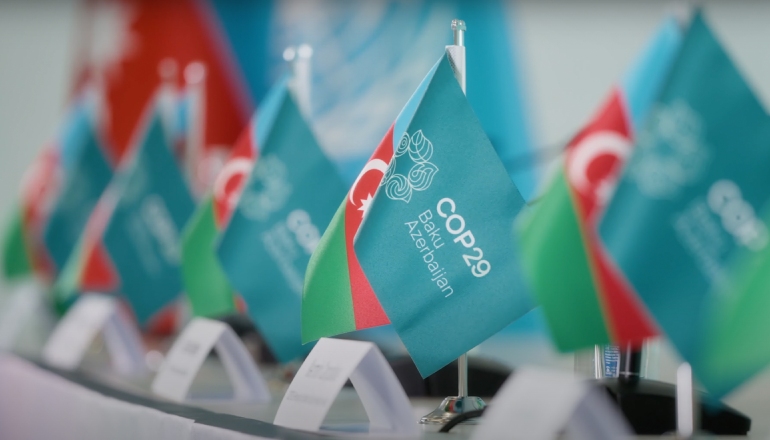COP29 in Azerbaijan is just three months away.
It is one of the most anticipated climate events in 2024.
More so because I am expecting action and actionable strategies from Baku, as against hollow promises in the past events.
There are couple of reasons, I am placing my bets on COP29:
1. Climate incidents have played global havoc. Disturbing climate incidents have displaced thousands of people as well as animals. The loss and damage are yet to be established.
2. The event has already sparked climate conversations. But more so because, the host country, Azerbaijan is taking the lead in mitigating climate action.
The country aims to reduce emissions by 40% by 2050 through climate mitigation plans, including gas-free power stations, renewable energy, and energy-efficient technologies. With these initiatives, Baku has set the ball rolling for member countries.
India, in particular, which has seen massive destruction because of increased natural disasters will be an active participant.
Here are some reasons why:
Till July 2024, India witnessed over 120 natural disasters ranging from cyclones, floods, flash floods, landslides, insect infestations, forest fires.
• The year 2023 has been the warmest year on record, with 1.48 degrees warmer than the pre-industrial average. The Centre for Science and Environment’s annual Anil Agarwal Dialogue revealed that 109 nations, including India, experienced extreme weather events in 2023, causing losses of 3,287 human lives, 2.21 million hectares, and 124,813 animal deaths.
• A World Bank Climate Change report predicts India’s average temperature to rise by 1.1-4.1°C by the end of the century, influenced by the 21st-century emissions pathway.
• The G20 Climate Risk Atlas highlights India’s already severe climate change impacts, predicting impacts up to 2050 and 2100 on various emission pathways.
• India faces severe climate impacts due to high emissions, with heatwave lengths increasing by 2,515% in 30 years, causing heat-related deaths 25 times higher than in 1990, destroying crops, and costing farmers 15% of income by 2050.
• Increased climate threats, including extreme heatwaves, hurricanes are interrupting the supply chain.
Grim picture?
IT CERTAINLY IS!
Even as the country limps from one tragic incident to normalcy, tragedy strikes another region with an equal or more devastating vigor. This is a continuing trend over the past few years with no solution in sight. Besides, every climate incident poses newer challenges.
WriteCanvas has consistently pointed out the ill effects of ignoring natural warnings (including climate change). I am hoping that the climate conversation at Baku is realistic. It just does not play on the lines of the previous COP editions that provide hope but no conducive solutions to mitigate climate change.
Climate finance at play:
The UNFCCC’s Standing Committee on Finance estimates that developing countries need $5.8-11.5 trillion by 2030 to meet their climate plans.
COP29 also aims to Paris Agreement goals including limiting global warming, adapting to climate change impacts, and mobilizing financing.
Experts augur that the faster India adopts low-carbon policies, it will face lesser climate impacts cascades. Limiting temperature rise to 2°C will see the cost of climate impacts in India drop to just 2% of its GDP by 2050 and 5.18% by 2100. At COP29, all eyes will be on ACT2025.
According to WRI, The Allied Climate Transformation (ACT) 2025 consortium is advocating for strong climate finance and support at COP29, focusing on 3.6 billion people in climate-vulnerable countries.
The consortium aims to meet the needs of developing countries and set an ambitious climate finance goal to support low-emissions economies. Climate-vulnerable nations face widespread devastation from climate change, and a lack of support for climate action is concerning.
The consortium’s Call to Action outlines concrete actions to support these countries, including setting an ambitious climate finance goal and ensuring quality finance, and accountability.
This will take into account the needs and priorities of developing country Parties, and will also include the operationalization of Article 6. Strengthening multilateral financial institutions and climate funds will contribute to creating an international enabling environment for success.
Debuting the New Collective Quantified Goal:
The UN climate conference in Baku will focus on the New Collective Quantified Goal (NCQG) to determine the new amount developed nations must mobilize annually to support climate action in developing countries starting in 2025.
Adopting the NCQG is crucial for the Paris Agreement. The COP29 Presidency aims to agree on an ambitious NCQG, considering the needs and priorities of developing country Parties, and facilitating transparency and accessibility.
The top negotiating priority is agreeing on a fair and ambitious NCQG on climate finance, considering developing country needs.
Strengthening multilateral financial institutions and climate funds, and mobilizing the private sector and philanthropy for climate action are also crucial in adopting the NCQG and implementing the Paris Agreement.
Our take:
COP29, we hope, will lay out actionable roadmaps for the pressing issues of Climate Fund mobilization and lack of action in the Paris Agreement. We also hope the world leaders align in their climate language, fast-tracking in actions, and accountability that measure impacts.

